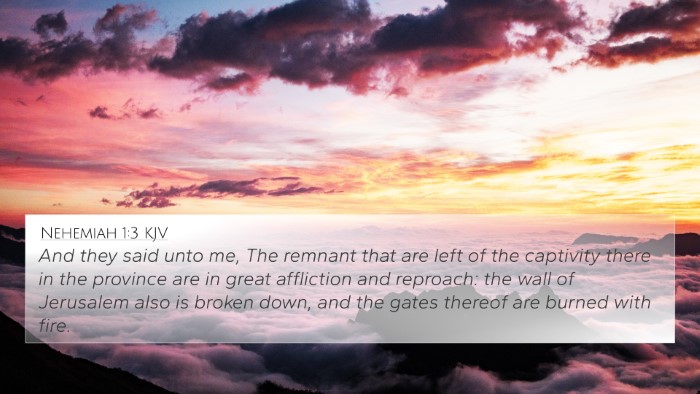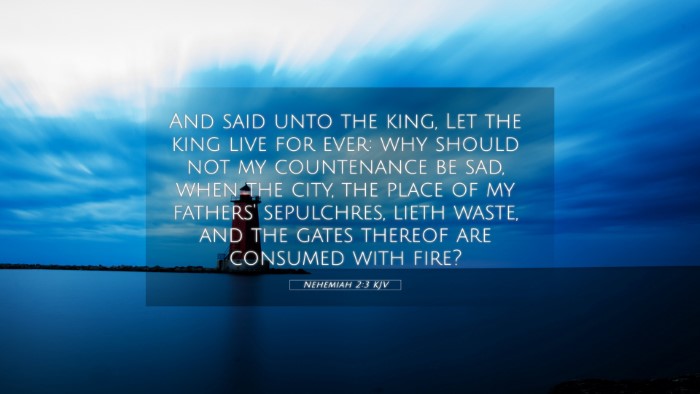Old Testament
Genesis Exodus Leviticus Numbers Deuteronomy Joshua Judges Ruth 1 Samuel 2 Samuel 1 Kings 2 Kings 1 Chronicles 2 Chronicles Ezra Nehemiah Esther Job Psalms Proverbs Ecclesiastes Song of Solomon Isaiah Jeremiah Lamentations Ezekiel Daniel Hosea Joel Amos Obadiah Jonah Micah Nahum Habakkuk Zephaniah Haggai Zechariah MalachiNehemiah 2:3 Similar Verses
Nehemiah 2:3 Cross References
And said unto the king, Let the king live for ever: why should not my countenance be sad, when the city, the place of my fathers' sepulchres, lieth waste, and the gates thereof are consumed with fire?
Uncover the Rich Themes and Topics of This Bible Verse
Listed below are the Bible themes associated with Nehemiah 2:3. We invite you to explore each theme to gain deeper insights into the Scriptures.
Nehemiah 2:3 Cross Reference Verses
This section features a detailed cross-reference designed to enrich your understanding of the Scriptures. Below, you will find carefully selected verses that echo the themes and teachings related to Nehemiah 2:3 KJV. Click on any image to explore detailed analyses of related Bible verses and uncover deeper theological insights.

Nehemiah 1:3 (KJV) »
And they said unto me, The remnant that are left of the captivity there in the province are in great affliction and reproach: the wall of Jerusalem also is broken down, and the gates thereof are burned with fire.

1 Kings 1:31 (KJV) »
Then Bathsheba bowed with her face to the earth, and did reverence to the king, and said, Let my lord king David live for ever.

Daniel 2:4 (KJV) »
Then spake the Chaldeans to the king in Syriack, O king, live for ever: tell thy servants the dream, and we will shew the interpretation.

Daniel 5:10 (KJV) »
Now the queen by reason of the words of the king and his lords came into the banquet house: and the queen spake and said, O king, live for ever: let not thy thoughts trouble thee, nor let thy countenance be changed:

Psalms 137:6 (KJV) »
If I do not remember thee, let my tongue cleave to the roof of my mouth; if I prefer not Jerusalem above my chief joy.

2 Chronicles 21:20 (KJV) »
Thirty and two years old was he when he began to reign, and he reigned in Jerusalem eight years, and departed without being desired. Howbeit they buried him in the city of David, but not in the sepulchres of the kings.

2 Chronicles 28:27 (KJV) »
And Ahaz slept with his fathers, and they buried him in the city, even in Jerusalem: but they brought him not into the sepulchres of the kings of Israel: and Hezekiah his son reigned in his stead.

2 Chronicles 32:33 (KJV) »
And Hezekiah slept with his fathers, and they buried him in the chiefest of the sepulchres of the sons of David: and all Judah and the inhabitants of Jerusalem did him honor at his death. And Manasseh his son reigned in his stead.

Daniel 6:6 (KJV) »
Then these presidents and princes assembled together to the king, and said thus unto him, King Darius, live for ever.

Lamentations 2:9 (KJV) »
Her gates are sunk into the ground; he hath destroyed and broken her bars: her king and her princes are among the Gentiles: the law is no more; her prophets also find no vision from the LORD.
Nehemiah 2:3 Verse Analysis and Similar Verses
Understanding Nehemiah 2:3
Bible Verse: Nehemiah 2:3 - "And said unto the king, Let the king live forever: why should not my countenance be sad, when the city, the place of my fathers' sepulchres, lieth waste, and the gates thereof are consumed with fire?"
Commentary Insights
Nehemiah, a servant to King Artaxerxes, expresses sorrow over the state of Jerusalem, highlighting the emotional burdens of leadership and fidelity to one’s heritage. His response to the king serves as a pivotal moment, demonstrating both respect and the urgency of his mission.
Contextual Analysis
Nehemiah's sadness is not simply personal, but deeply rooted in the conditions of his homeland. This reflects a theme throughout the Scriptures where the physical state of cities and nations aligns with the spiritual state of God’s people. Through his sorrow, we see a leader’s heart aligned with God’s concern for His people.
Emotional Weight of Leadership
Nehemiah's role illustrates the emotional toll of leadership (see Nehemiah 1:4). He did not take his position lightly; his burden for Jerusalem was transformative, serving to motivate him towards action.
Cross-References
- Psalm 137:1-4 - Mourning for Zion in Babylon; echoes a longing for homeland.
- Ezra 1:2-4 - The call to rebuild Jerusalem; underscores Nehemiah’s mission.
- Jeremiah 29:11 - God’s plans for His people relate to restoration themes.
- Lamentations 1:1-5 - Desolation of Jerusalem as a context for sympathy.
- Matthew 5:14 - The city set on a hill not hidden; highlighting the importance of visible witness.
- Romans 9:1-3 - Paul’s sorrow for his people parallels Nehemiah’s heart.
- Philippians 2:20-21 - Emphasis on genuine concern for others’ welfare.
- James 4:9 - Double-mindedness and sorrow as part of coming close to God.
- 1 Peter 5:7 - Casting our cares upon Him reflects the burden Nehemiah carries.
- 2 Corinthians 7:10 - Godly sorrow leading to repentance illustrates the importance of emotional response.
Thematic Connections
Nehemiah’s lament highlighted in this verse resonates with several inter-Biblical themes such as restoration, the significance of community, and the sacrificial leadership attributed to those called by God.
Linking Bible Scriptures
The connections drawn from Nehemiah 2:3 with other scriptures reveal a broader narrative about God’s commitment to His people and their ultimate redemption. In a similar vein, Paul expresses deep emotional ties to his community in Romans, indicating a continuum of concern among God’s leaders.
Applying the Insights
For those seeking to engage deeper with the text, utilizing tools for Bible cross-referencing can illuminate the rich tapestry of connections between this verse and related scriptures.
Using Cross-Referencing Tools
Various resources, such as Bible concordances and Bible reference guides, can enhance understanding. Whether for personal study or sermon preparation, exploring thematic Bible verse connections can lead to profound insights.
Final Thoughts
Nehemiah 2:3 serves as a poignant reminder of the bond between emotional states and spiritual duties. As believers, we are encouraged to embrace our struggles as part of God’s calling while nurturing a compassionate heart toward those around us.
Conclusion
Thus, interpreting Nehemiah 2:3 through the lens of various cross-references enriches our understanding and deepens our appreciation for the Scriptures as a cohesive narrative woven by God.





